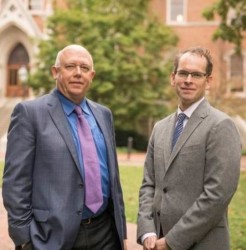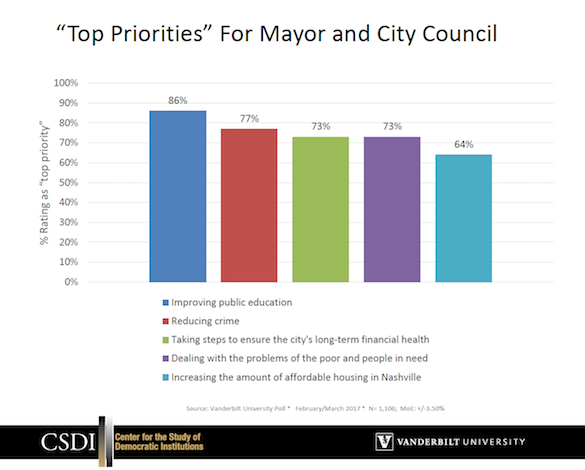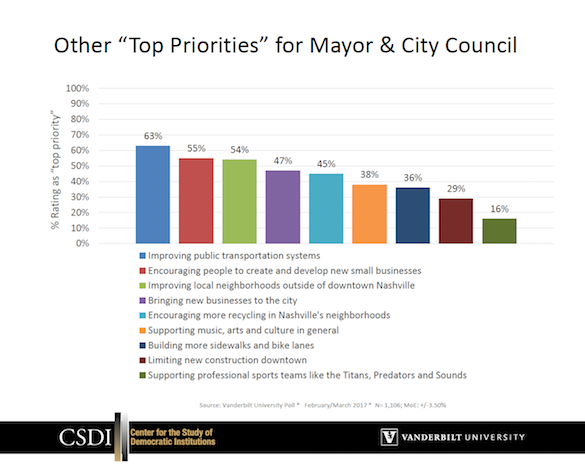
Davidson County residents give high marks to Mayor Megan Barry, but are concerned about the pace of Nashville’s growth and want to improve public transportation, according to the most recent Vanderbilt Poll of Nashville.
The poll, conducted by John Geer, Gertrude Conaway Vanderbilt Professor of Political Science, and Josh Clinton, Abby and Jon Winklereid Professor of Political Science, surveyed a racially and ethnically representative sample of 1,106 registered voters in Davidson County about a wide variety of issues between Feb. 27 and March 19, 2017.
The Vanderbilt Poll is funded by Vanderbilt’s Center for the Study of Democratic Institutions. This is the second poll to focus on Nashville; the first was conducted shortly after Megan Barry’s victory in the 2015 mayoral election.
Support strong for mayor, Nashville economy
Mayor Barry has a 72 percent approval rating, suggesting that she has won over a significant number of Davidson County residents since her tough election battle against David Fox. Eighty-six percent of Democrats think she’s doing a good job, while 65 percent of independents do. She has even earned the support of a majority of Nashville’s Republicans, 56 percent.
Confidence in Nashville’s economy is rising, with 32 percent describing it as “very good” and 54 percent calling it “fairly good.” In 2015, 20 percent of citizens described the Nashville economy as “very good.” “This 12-point increase aligns nicely with the many indicators we see around the city of economic growth,” said Clinton.
Metro Police: Trust but verify
The poll shows solid support throughout the city for Metro Police, who earned an overall approval rating of 80 percent. But there are important differences across different groups, the researchers say. Notably, among whites, approval is 88 percent, 79 percent for Hispanics and drops to 66 percent among African Americans.
By contrast, African Americans, Latinos and whites all overwhelmingly support the use of body cameras—93 percent overall. “[rquote]Everybody wants body cameras,” Clinton said.[/rquote]
A strong majority of residents support some form of legalization of marijuana, with 45 percent in favor of legalizing it for medical use and another 40 percent in support of personal use.
Growth: Too much of a good thing?
The percentage of residents saying Nashville is on the right track has declined from 72 to 68 percent, still a strong showing, Geer said, but added, “There are some warning signs in these data. Consider that the proportion of residents who think Nashville’s population is growing too quickly jumped, and the proportion who think construction of new buildings is up as well.”
Sixty-five percent of residents think too many people are moving here—up from 50 percent two years ago—and 60 percent say too many buildings are going up at once—up from 47 percent. “But those warning signs are all set within a very positive story about Nashville,” Geer said.
Nashville residents strongly support initiatives to improve public transit. Eighty-six percent support a citywide referendum to let residents vote on increasing public transit funding, and about two-thirds support a modest sales tax increase to help pay for transit improvements.
Nashville’s top priority remains education

When asked what the Nashville government’s top priorities should be, most said improving public education came first, while crime was the second most commonly cited “top priority.”
“The worries about public education are reflected in the judgments residents have about the success of grade schools and high schools,” Clinton said. “Neither was judged to be very effective.” This pattern was detected during the 2015 poll as well.
Opinions about charter schools have not changed either: About 42 percent of citizens want more charters; 48 percent don’t. “On education, it’s a picture of stability,” Clinton said.
At 49 percent, the school board’s approval rating has risen slightly since 2015, which may reflect some of the changes in the leadership of our public schools. There are also variations by race. Hispanics were most likely to think the board was doing a good job, at 68 percent, while only 56 percent of African Americans and 41 percent of whites agreed.
The lowest priority of Nashvillians was supporting professional sports teams. However, 58 percent did favor building a professional soccer stadium at the Fairgrounds.

Nashville and national politics
Nashville remains a solidly Democratic city, but a moderate one—33 percent characterize their positions as moderate, while 31 percent considered themselves liberal and 29 percent conservative. Support for President Trump is low in the city, only 27 percent, and it is almost entirely concentrated among self-identified Republicans—84 percent. Just 30 percent of independents and 7 percent of Democrats approve of the new president.
Nashville residents approve of the job Congressman Jim Cooper is doing, with 53 percent approving and only 21 percent disapproving. “His numbers are not as high as the mayor’s, but he still enjoys substantial approval within the city,” said Geer.
On immigration issues, Nashvillians generally favor policies that allow undocumented immigrants to remain in this country. Seventy percent believe they should be allowed to stay and apply for citizenship, with an additional 14 percent saying they should be allowed to stay as guest workers. Fifty-two percent “strongly oppose” and 16 percent “somewhat oppose” deporting undocumented parents of U.S. children, and only 38 percent think local law enforcement should be tasked with enforcing federal immigration laws. By and large, Hispanics were the most likely to support measures that allow undocumented immigrants to stay, followed by African Americans and then whites.
Nashville is neighborly
Almost everyone in Nashville talks to their neighbors at least a few times a month, while 27 percent report chatting almost daily and 37 percent check in with each other a few times a week.
Fifty-three percent of respondents say they wouldn’t mind having an investor-owned short-term rental house, such as an Airbnb, in their neighborhood, while 39 percent oppose it.
In keeping with the generally favorable view of the city, 73 percent say they have no plans to move away.
About the Vanderbilt Poll
The Center for the Study of Democratic Institutions (CSDI) launched the Vanderbilt Poll to provide a non-partisan and scientifically based reading of public opinion within the state of Tennessee and the city of Nashville. The Vanderbilt Poll conducts statewide surveys at least twice a year and now does a yearly poll of Nashville. The focus of the polls is to uncover what citizens think about important public policy issues and to make the findings available to citizens, policy-makers and scholars. Since 2011, the Vanderbilt Poll has surveyed more than 17,000 Tennesseans and all poll results are available at www.vu.edu/poll.